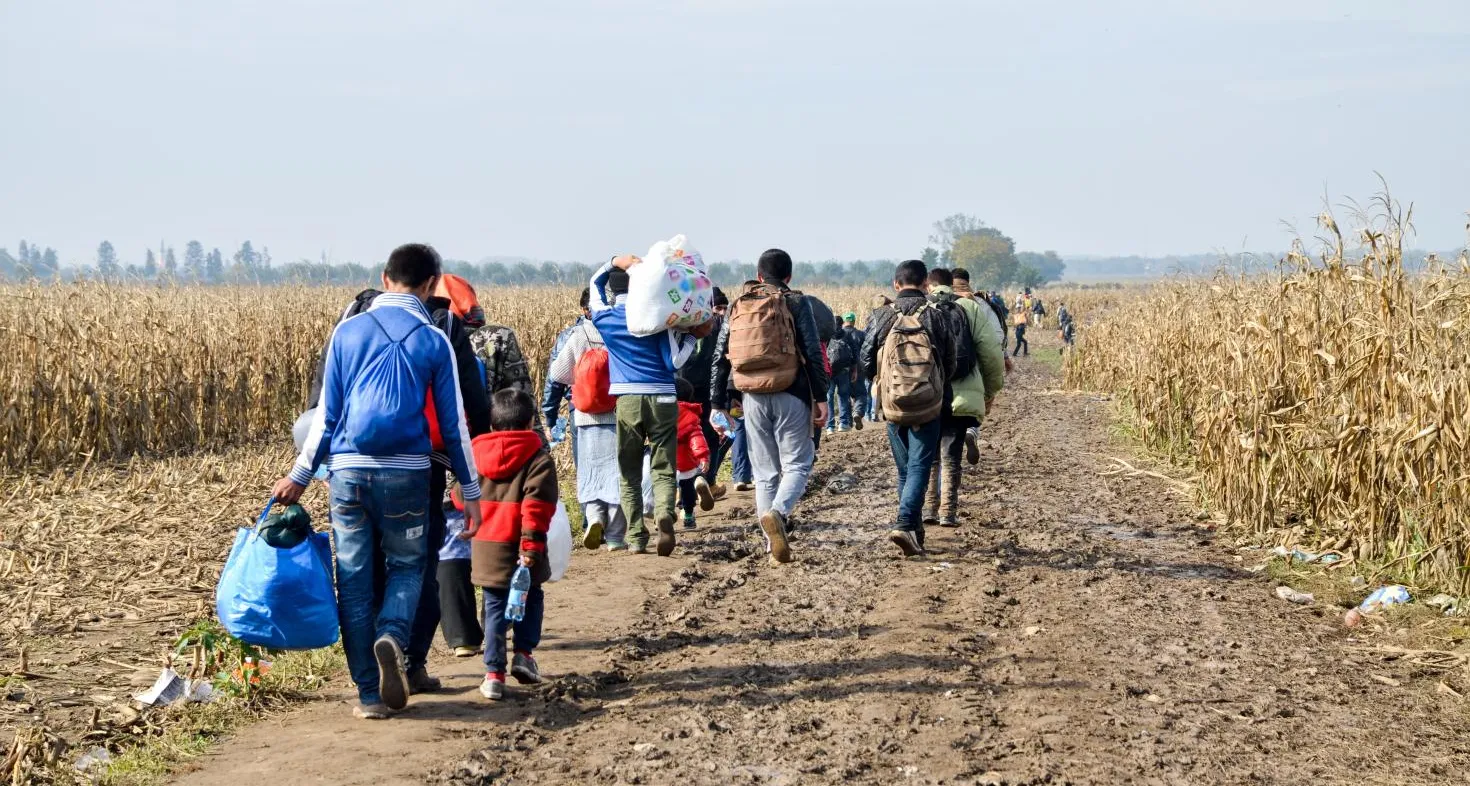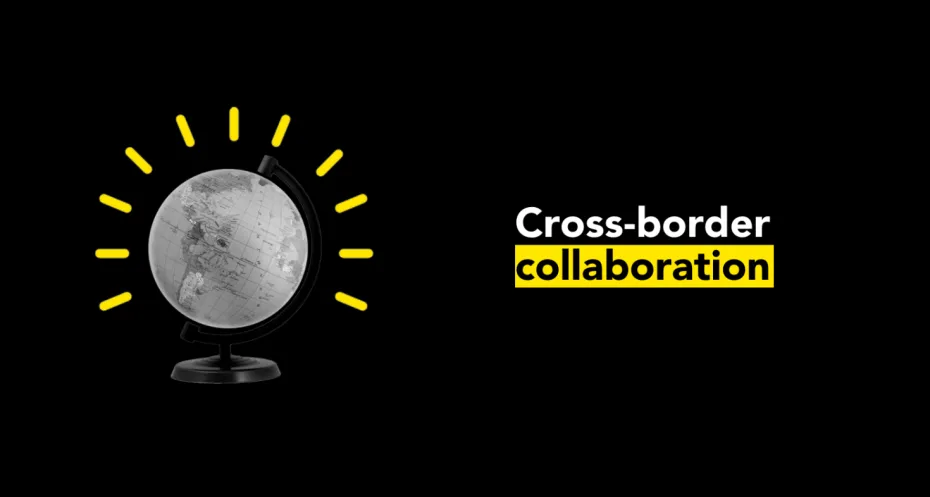
Investigative journalism into human trafficking: the insights and challenges
On World Day Against Human Trafficking, we pay attention to the role of investigative journalism in the fight against human trafficking. What abuses and loopholes in the system do investigative journalists uncover? What are the challenges? We talk to Sanne Terlingen and Monica Lam, investigative journalists from Lost in Europe.
Lost in Europe is a investigative collective where journalists from different European countries work together on research on the theme of migration. They focus on human trafficking and unaccompanied minors who disappear from the radar after arrival in Europe.
Free Press Unlimited supports this as part of the Mind the Children project by, among other things, realizing a secure communication platform for Lost in Europe journalists.
Sanne, it has been 5 years since you founded Lost in Europe together with Geesje van Haren. How do you look back on the reason you started and how things are now?
“We started, of course, in response to Europol's 2016 report that 10,000 children were missing in Europe. We wondered: How is it possible that no one knows exactly who those children are, where they are, what happened, how is that possible? This is, of course, a problem that we have far from solved. The urgency is still very high. This is also apparent from our recent data survey which showed that more than 18,000 children disappeared from the radar in Europe between 2018 and 2020.
I certainly haven't made all the stories I wanted to make yet. We first spent a lot of time setting up an international research platform with people who are all able to work with this target group and these resources. We didn't want it to be a one-off collaboration. There really had to be a bond of trust between all the people who cooperated. And that is because we work with super vulnerable sources. You do not want a single journalist to misinterview a child or refugee who may also be a victim of human trafficking.”
Part of setting up a sustainable research platform is the arrival of a secure communication platform, set up by Free Press Unlimited. What is the importance of this for your work?
Monica: “We were always looking for ways of secure and efficient communication. We switch between Google drive and Signal continuously. We have tried many different things. Because we work cross-border, you also have to deal with different European countries and sometimes it can get confusing. The new platform has a very handy way of structuring. And it provides extra security for sensitive information and resources.”
Sanne: “It makes it easier to share information with each other. The way we work is, there are different puzzle pieces being investigated in different countries. I can investigate a piece and, for example, a colleague in Germany and in Italy can investigate a piece. But the moment we can really put those three together, because we can share our information, we get a lot further than when we can show three separate puzzle pieces. Then we may also see connections that allow you to better understand the system behind the disappearances of minors, or see how criminal networks work or run into different problems in different countries. And for this, email is not secure enough, for that we need a secure system like this platform.”
And what is the sensitivity of the information you share?
Sanne: “We of course handle privacy-sensitive information of often children. Naturally you want to be very careful with that, so that it only ends up in the hands of people who know how to handle it. You may also need to protect resources. Sources can be refugees or migrant children who say something about a criminal network. You absolutely do not want that information to end up in the hands of a criminal network.
It may also concern documents that we have received from sources in the asylum system. So imagine someone that works at a reception agency for asylum seekers or at the Ministry of Justice or the Immigration and Naturalisation Service, where an employee can be fired if it becomes clear that they are handing over information to us. You want to protect that well.”
And do you feel safe in your work?
Both: “Yes, so far.”
Sanne: “We have not yet conducted any extremely risky studies. Of course it sounds dangerous, writing about human smuggling and human trafficking, but the moment you do not unmask one specific perpetrator or group that is experiencing the consequences, it is not unsafe for us journalists. Only if you really make someone very angry individually, get into his business, then it becomes dangerous. For me this is not dangerous now, but it could become when we do more, so it is good to be prepared for that.”
Monica: “We also had safety training to increase awareness. You then learn to determine where the risks are.”
How can you avoid risk?
Sanne: “By thinking carefully about the risks beforehand, you can usually avoid them. For example, if you make a plan about where to store information in case something happens to you, you can be sure that your sources are safe. But I can't say too much about it, because it will not work if it becomes known how we do it. But suppose you are dealing with secret documents, then it is smart if you deposit that information in different countries, because it is very difficult for the judiciary to raid two countries at the same time. In any case, you should not mention the name of your source or other traceable data in your notes, that is also something we do.”
The war in Ukraine has initiated a new stream of refugees, including minors. Are you doing research there now?
Monica: “When we saw this happening, we immediately put our heads together to discuss what we should do with it. We decided to do data research in the first place. We then requested data from various countries about how many minors entered a specific European country without a guardian. And we also asked how many victims of trafficking or potential victims of trafficking have already been identified. A number of European countries have responded to this, including the Netherlands, but a number of countries have not yet responded. Many countries simply do not have that information ready, or do not register properly whether minors are entering. We will publish a publication about this at the end of August.”
Today is World Day Against Human Trafficking. What insight has your research given into the background of human trafficking and how to combat it?
Sanne: “I really see two different things. On the one hand, I think there is a need to push through difficult legal cases. So take matters that are complex to the European Court to really fight it out. So that there will be an example case that can be used in other asylum cases to protect children.
We already touched on this in our story of the two Vietnamese boys, Quyen and Hieu, who died in a truck in Essex. They were in a protected shelter in the Netherlands. They did not want go with a human trafficking network, and they wanted to report human trafficking. But the police saw no leads for that, even though they were clearly there. These boys had debts and they were minors, but the police did not take that seriously and registered the report as human smuggling, so they received no protection. They eventually rejoined that network. And then the Dutch police chased them as they crossed the border, which is not allowed at all because with every sign of human trafficking or people smuggling of a minor you have to rescue them from that situation. So the Netherlands was very negligent there and when the boys ended up in Belgium, the Belgian state was also negligent, according to research by our Lost in Europe colleagues Roeland Termote and Wouter Woussen. There should have been a party that really makes a point of that. Not only journalists, but also legally, to slap the state on the fingers and make sure that something is done about it. Because in principle, the Dutch state is responsible for protecting unaccompanied minors who report here.
Then there's something I've learned from our research into Nigerian girls who disappeared from shelters, about what helps keep those kids safe. They have always had to rely on a smuggling network for their safety, within which there was a lot of insecurity. And if you come out of such insecurity, you only dare to tell what is going on when you see that someone else is and remains reliable. If you keep changing location and employees, then there is no more room for personal attention, and those children will no longer tell you what is going on with them.
The development of a bond of trust between shelter staff and the children has actually disappeared from the system, so there is much less insight into all the reasons why these children may run away. And the children no longer know who to turn to if they really don't want to disappear. So that human touch has to come back. That is what I have learned, that this is perhaps even more important to keep children safe, than a lot of reports and a lot of extra care providers and a lot of extra checks and balances. That there are just people watching them and seeing how they are doing.”
And in terms of impact of your research, are you concerned with that?
Sanne: “I find that very complicated myself. We have also chosen the perspective of children, because then you stay away from politics. We show very clearly that children are unsafe, that there is no proper shelter to protect them from human traffickers, and that this is unacceptable and against human rights.
I think our stories have an impact because we don't say 'we want all children to have asylum from now on'. If we did, we would be seen as activist. The moment you are seen as a party in the refugee debate, which gets so polarized, I think you lose your impact. We are always out to expose wrongdoing. We may look into the criminal network and expose it, but it may also be that the government is in the wrong because they do not protect children properly. We show in its entirety what goes wrong, and who is responsible for it.”
Monica: “For example, the story I made about the Dublin claim has put things in motion. This research is about how in 2019 the residence permit scheme in the Netherlands was adjusted for people who have a Dublin claim. Before this, a temporary residence status was issued in the Netherlands if it came to light that someone may have been a victim of human trafficking. Then the person would at least have some time to report it, but also to recover.
That has changed in the Netherlands in 2019. As a result, if you are the first to register in another European country, you have to return to that country. But research shows that that is often the country where they have become a victim of human trafficking, in the case of this study in Italy. The victims, of course, do not want to return to the country where they experienced this because they are afraid of their traffickers. That is why they often choose to live undocumented in the Netherlands and that happens on a fairly large scale. So what you see happening in the Netherlands is that not everyone has a guarantee to be protected if they are a victim of human trafficking, because that protection is linked to a residence status.
And now questions have been asked to the Dutch Secretarty of Asylum by the Dutch party ChristenUnie, in which they also refer to this research. So I am very curious how the Secretary will look at this and whether the current regulation surrounding the Dublin claim will be reconsidered. It is also possible that in response to this, we will conduct a follow-up study.”
How is the persecution of perpetrators people smuggling going?
Monica: “Recently we were able to demonstrate in a research that something is going wrong at the borders of Europe where many migrants arrive. That investigation revealed that underage asylum seekers are smuggled on a boat, arrive on mainland Europe and then are arrested there. But instead of being seen as asylum seekers, they are seen as smugglers. They are tried for that, often in a fast trial, where it is determined within two hours whether someone is a smuggler or not. And often they end up in jail. This research has been published in Spanish, English and Greek. Now I am working on publishing this research in Dutch as well.”
And what lies ahead for Lost in Europe in the near future?
Sanne: “One of the subjects I will be working on is safety at asylum seekers' reception centres. This encompasses a lot of topics, for example which incidents there are around reception centers, and with regards to the Netherlands, the asylum seekers who now have to sleep outside at the Ter Apel centre. But there is a core problem that is not yet sufficiently been put on the map, and this is that all asylum seekers arrive with debts. They have to pay for their travel, they have to pay for family reunification, they have to pay for the safety of family left behind in their country of origin. They come to a shelter, but are not allowed to work. In addition, they have already had contact with a criminal network. What is the consequence of this?
We will also work on the ‘18 project’. This was recently pointed out by the Ombudsman for Children in the Netherlands, but not much attention has been paid to it in the rest of Europe. We will start in the Netherlands with a thorough investigation of how the system simply drops asylum seekers who turn eighteen. Because then they are suddenly treated like adults. The Dutch system, which is made up of many allowances and tax rules, is already complicated for many Dutch people. Imagine being here as a seventeen year old or as a seventeen and a half year old who doesn't speak the language well. Then you are told that you can go to school and you are placed in a residency, and within six months this all ends. Then you are expected to find your way in the system as an adult or you are expected to travel back to your country of origin. The social safety net for these young people is very minimal.”
Monica: “For Lost in Europe in general, I think we are focusing on growing and expanding even further. We are already in many European countries, but hope to have a representative in every country within the EU.”



